The week ahead in Parliament
- Published
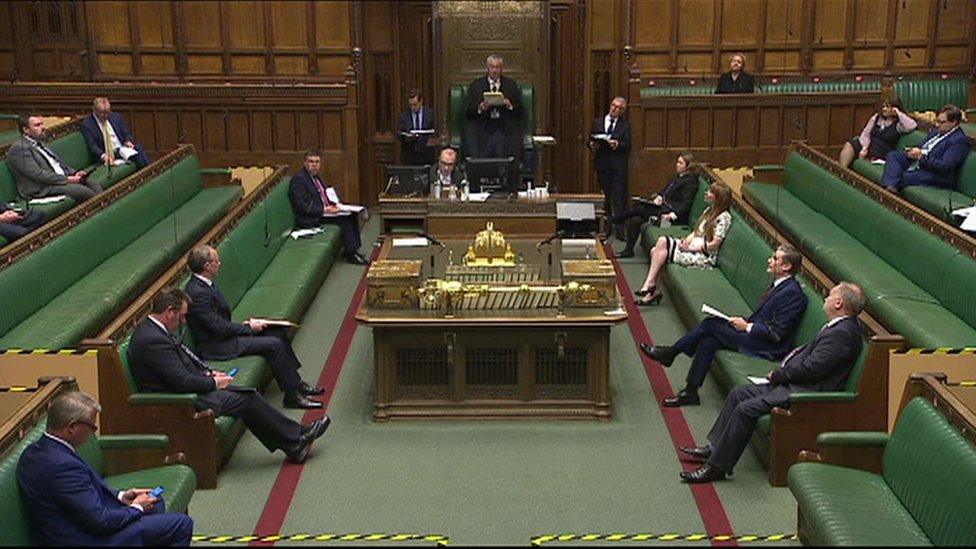
Parliament enters its pre-summer glidepath to the holidays, with MPs departing on Wednesday and noble Lords carry on legislating for a further week.
But there's no sense of a lull - with plenty of political and legislative action on the pandemic and Brexit.
And there is the entertaining new sub-plot around the Intelligence and Security Committee, now preparing to publish its long-delayed report on Russian interference in the UK.
The political manoeuvrings which placed the (now-ex) Conservative veteran Julian Lewis in the chair have tickled Westminster, and the government's retaliation has simply kept the story alive.
At Commons business questions on Thursday, the Leader of the House, Jacob Rees Mogg, pointedly declined to promise he would not seek to remove Mr Lewis from the ISC, so one thing to watch out for is a motion to that effect appearing on the order paper.
It might not get through - Mr Lewis is a political maverick and a pro-Brexit Bercow ally (which is an interesting combination).
Any attempt to unseat him might upset already restive backbench heavyweights, who could use a vote on his position to signal their unhappiness about the lockdown, the conduct of Brexit and a basket-load of other grievances.
The casting vote
Meanwhile, it is also worth remarking the membership of the ISC, including four Conservative MPs - Chris Grayling, Sir John Hayes, Mark Pritchard and Theresa Villiers - alongside the now independent Mr Lewis, would have comprised a government majority over the combined opposition members.
Those members, by the way, are Labour's Kevan Jones, Dame Diana Johnson and Admiral Lord West, plus the SNP's Stewart Hosie.
Now Mr Lewis has a casting vote and is able to use it. Where might that lead?
In the last two parliaments, there was no party majority on the ISC, reflecting the closely balanced membership of the Commons.
There was a Coalition majority in the Coalition years, and a Labour majority in the 2005-10 Parliament.
But in the past, a lot of the judgmental ballast came from a contingent of massively experienced ex-ministers and civil servants from the Lords - such as Tom King, Geoffrey Howe, MI6 veteran Baroness Ramsay of Cartvale and former mandarin Lord Butler.
This time round, the sole peer is the former security minister, Lord West. It's a subtle, but possibly important, shift.
All in the detail
The remaining parliamentary action is about either polishing off legislation or teeing up important bills for detailed scrutiny in September.
This means a lot of second readings in the Lords and, refreshed by their summer break, peers look set to plunge into several days of detailed voting on the Agriculture Bill on their return.
In the Commons, Monday and Tuesday will see some intensive action to dispose of important measures on post-Brexit trade and terrorist sentencing.
September will probably see the detailed scrutiny of the Extradition (Provisional Arrest) Bill, where there has been some interesting preliminary manoeuvring by some interesting alliances.
The bill creates a new power of arrest for extradition to designated countries.
Former Conservative leader Iain Duncan Smith, Labour's Sarah Champion and busy Conservative backbencher Bob Seeley have amendments down to block extradition agreements with China or the Hong Kong special administrative region, while former Brexit Secretary David Davis wants to block extradition arrangements with the US.
The fact of a large government majority does not seem to have silenced the awkward squad.
Here's my rundown of the weeks ahead:
Monday 20 July
The Commons convenes at 14:30 BST for housing, communities and local government questions - doubtless including some targeted at the under-fire Secretary of State, Robert Jenrick.
Then, expect the usual crop of post-weekend ministerial statements and urgent questions, prompted by headlines in the Sunday papers.
This may include a statement about the relaxation of the lockdown and the new powers the government wants for itself and local councils to control local flare-ups of Covid-19.
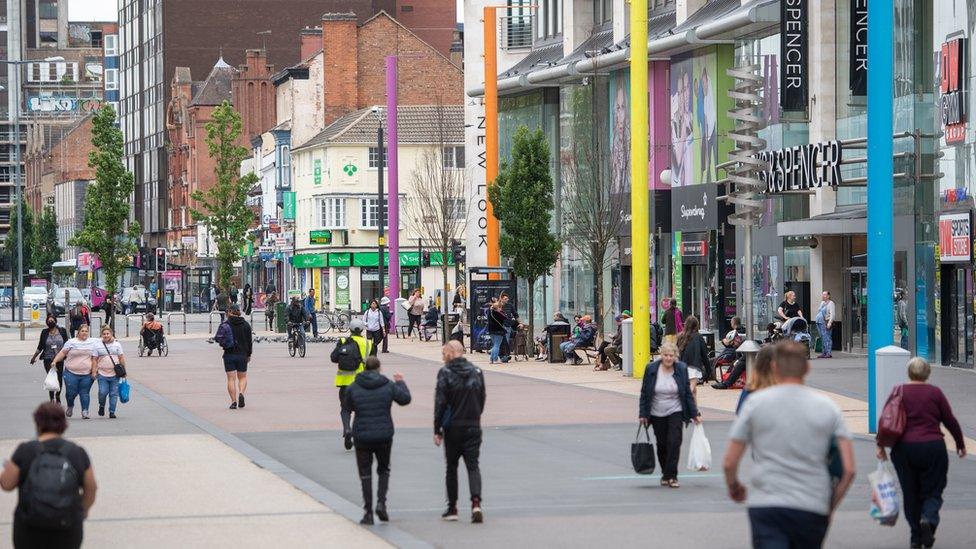
A local lockdown was announced for Leicester on 29 June
The main legislative action will be the report stage consideration of the Trade Bill - there are currently 31 pages of amendments, so we can expect some votes and much interest in the selection of lead amendments for discussion.
The bill creates a framework for post-Brexit trade policy, so much of the debate will focus on the parliamentary process for dealing with agreements - which may have far-reaching consequences for domestic interests.
Labour, for example, are proposing that confidential negotiating documents should be available to select committees.
They want a review of each free trade agreement the UK signs up to every five years, to make sure a trade agreement would need to be ratified before regulations could be made to implement it, and to introduce a requirement for imported agricultural goods to meet the same animal health and welfare, environmental, plant health, food safety, and other standards as UK goods.
And the party has an amendment to protect the NHS and publicly funded health and care services from any form of control from outside the UK.
It will all be debated to a deadline, with the report stage due to conclude at 21:00, and the third reading concluded by 22:00.
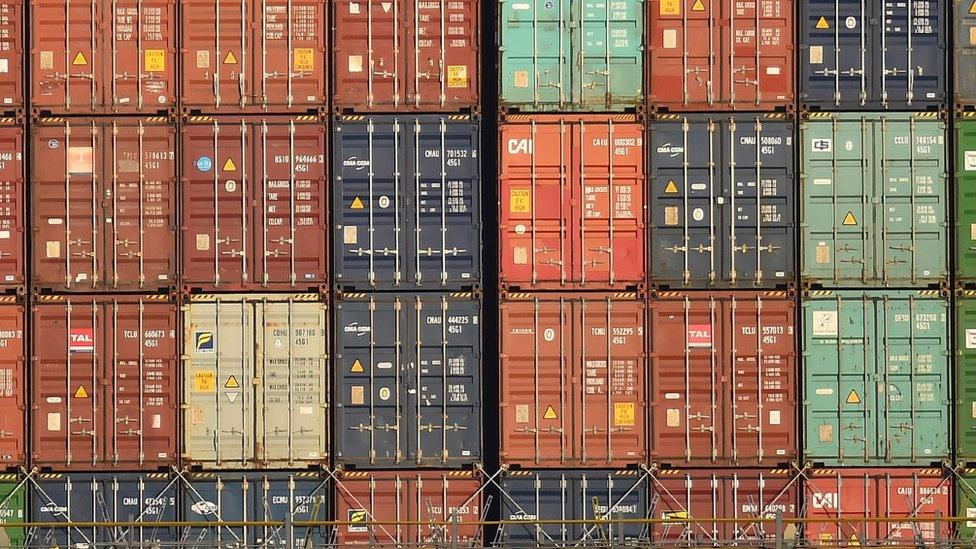
There will be much debate on the future of trade in the UK
There's a great deal of activity from a group of backbenchers, led by former minister Jonathan Djanogly, and the Environment, Food and Rural Affairs Committee chair, Neil Parish.
For example, they want parliamentary approval of trade agreements, requiring the international trade secretary to get approval for negotiating objectives from the Commons and the Lords before negotiations towards a free trade agreement commence.
Other proposed new clauses reinsert pledges made by the government during consideration of an earlier incarnation of the Trade Bill in 2018, during Theresa May's premiership - such as requiring a report to Parliament before the UK ratifies a new free trade agreement with a country that had a free trade agreement with the EU.
The report would have to set out any significant differences between the proposed new agreement and the existing agreement with the bloc.
The SNP has amendments giving the government a duty to protect the quality of the domestic food supply by ensuring that imports have to meet the same standards as domestic food, and to restrict market access to healthcare services.
The Greens' Caroline Lucas and Plaid's Ben Lake have a new clause which aligns the UK's trade policy with the climate and environmental agenda.
And the Lib Dems' Sarah Olney has an amendment calling for human rights impact assessments on new trade deals.
This is far from an exhaustive list of the amendments, but it seems highly likely that a number of them will be forced to a vote.
MPs will also be asked, on the nod, to extend their current pandemic proxy voting rules into September.
The adjournment debate, led by former cabinet minister Chris Grayling, is on the protection of endangered species and restoration of habitats in developing countries - which might give some uncharitable souls the chance for a bit of merriment at his expense, if they're prepared to stay up late.
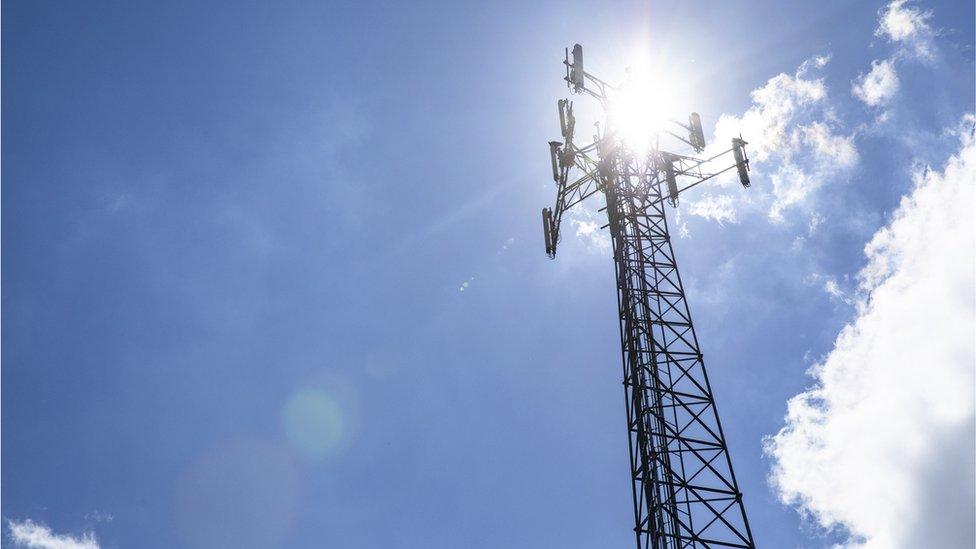
Telecoms infrastructure will come up in committee
On the committee corridor at 09:30, the Digital, Culture, Media and Sport Committee looks at technology use during the pandemic, and the implications of increasing reliance on digital platforms.
The committee will investigate the opportunities and risks this presents to consumers and businesses, and take evidence on telecoms infrastructure, AI adoption in the workplace and digital up-skilling.
The witnesses include James Heath, chief executive of the National Infrastructure Commission, Richard Piggin, of Which?, Felicity Burch of the CBI and Harry Armstrong of Nesta.
The Public Accounts Committee takes evidence at 14:30 about the NHS nursing workforce and the drive to end the shortage of nurses, from Sir Chris Wormald - the top civil servant at the Department for Health and Social Care, and other senior officials.
The Human Rights Committee has a hearing at the same time on black people, racism and human rights with NHS chief midwifery officer, Professor Jacqueline Dunkley-Bent, the chair of the Equality and Human Rights Commission, David Isaac, and the watchdog's CEO, Rebecca Hilsenrath.
In the Lords from 13:00, question time covers independent pharmacies, biodiversity targets, making England smoke-free by 2030 and ensuring young people leaving school in this academic year are prepared for work in a post-Covid-19 environment.
Then peers move on to the detail of the Business and Planning Bill - the measure to help businesses recover from the lockdown, with a variety of planning relaxations.
The bill was rushed through the Commons, and now there is some concern about the impact of measures to allow more off-licensed alcohol sales and pavement drinking.
Report stage is the normal moment for peers to make serious attempts to rewrite a bill, and there are plenty of amendments in the offing to tighten up the system for pavement licences - for example, to prevent takeaway drinks in glasses, to allow local councils to ban smoking, and to limit the hours for off-premises alcohol sales.
The theme of many of the amendments is to limit the impact on the community and environment.
The third reading will follow immediately and, if there are amendments, it is possible the bill will bounce back to the Commons so MPs can consider them before the recess.
Tuesday 21 July
The Commons day begins at 11:30 with business, energy and industrial strategy questions.
The day's Ten Minute Rule Bill, from the former prime minister Theresa May, will propose increasing the maximum sentence for causing death by dangerous driving to life imprisonment.
Then, there's more heavy-duty legislating - this time on the Counter-Terrorism and Sentencing Bill, which aims to ensure the sentences served by terrorists reflect the severity of offending and strengthen the tools for monitoring them in the community.
Labour has a series of amendments down, calling for reviews on the impact of different aspects of the bill.
The House may also consider Lords amendments, presumably to the Business and Planning Bill.
The adjournment debate, led by Labour's Rosie Duffield, focuses on tackling the misuse of nitrous oxide - otherwise known as laughing gas.
The UK is a big consumer of the drug and it is particularly popular among 16-24s.
It causes brief euphoria and fits of laughter, but it does this by interfering with oxygen supply to the brain, and can cause severe headaches, difficulty breathing and unconsciousness.
It has been linked to 25 deaths since 2010 and Ms Duiffield will argue for a review into the classification of nitrous oxide, along with fast action on how the sale can be further restricted to professional catering and medical consumers.
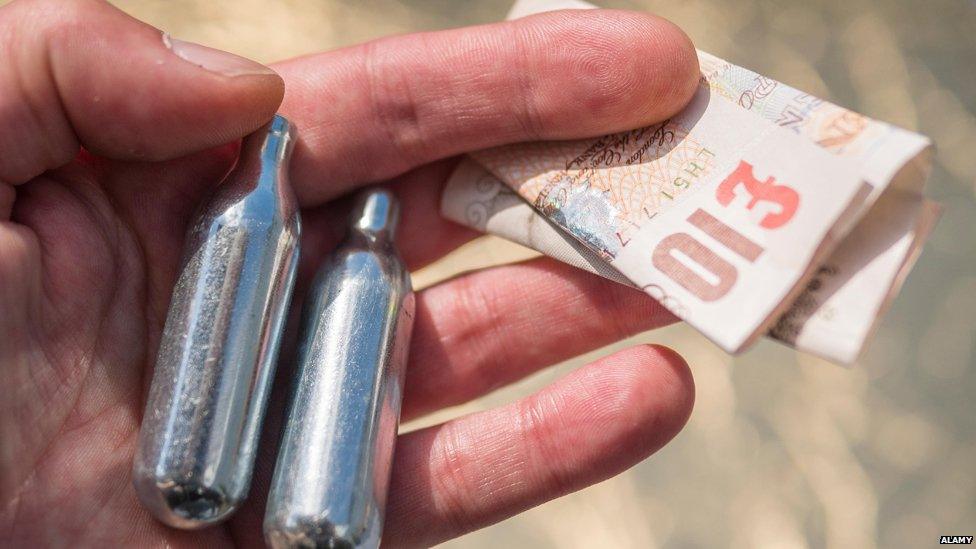
Nitros Oxide will be the focus of the adjournment debate
On the committee corridor, the Public Administration and Constitutional Affairs Committee kicks off at 09:30, continuing its look at the the Fixed-Term Parliaments Act - the Coalition-era legislation setting the time between general elections at five years and requiring a two-thirds majority in the Commons for an early election.
The early elections of 2017 and 2019 have led to calls for reform, and the committee will hear from Mark Harper, the minister who guided the act through the Commons, and Chloe Smith MP, his latest successor as the minister dealing with constitutional issues in the Cabinet Office
The Health Committee also starts at 09:30 and will question chief medical officer Professor Chris Whitty on testing strategy, the UK's high mortality rates and what happened in the care sector as part of its inquiry into the management of the first wave of Covid-19.
In the Lords at 12:00, questions to ministers range from the political situation in Hong Kong, the impact of the Covid-19 pandemic on social mobility, and the effect of the outbreak on the childcare sector.
After that, peers continue their yomp through the detail of the Agriculture Bill with the fifth day of committee stage consideration.
Wednesday 22 July
The Commons final day of term opens at 11:30 with half an hour of women and equalities questions, followed by Prime Minister's Question Time.
The day's Ten Minute Rule Bill, from Labour's Jessica Morden, is on terminally ill people in the welfare system.
And that will be followed by the end of term debate in which any MP can make a speech about any matter they wish to raise.
After that - barring a summer recall - MPs will depart until 1 September.
There's a bit of last-day committee action too.
The Housing, Communities and Local Government Committee starts at 09:30, hearing from Secretary of State Robert Jenrick and the Minister for Regional Growth and Local Government, Simon Clark.
The Work and Pensions Committee kicks off at the same time, with Secretary of State Therese Coffey speaking on safeguarding vulnerable people - namely, how her department learns lessons from serious cases.
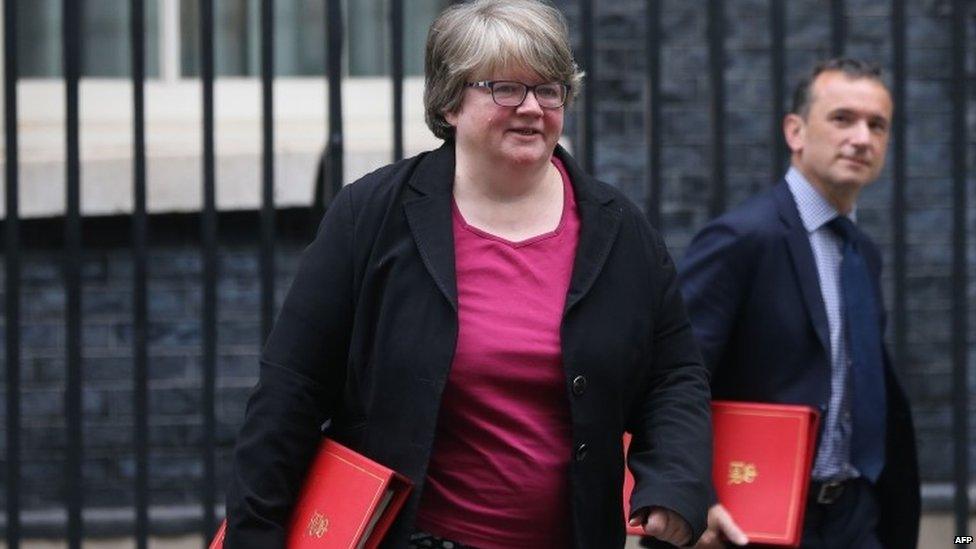
Therese Coffey will appear at the Work and Pensions Committee
The Science and Technology Committee at 14:30 has a session on the UK's domestic capability to manufacture telecommunications infrastructure.
Its chair, Greg Clark, has issued a public invitation to Digital Secretary Oliver Dowden to come and give evidence on how he would ensure the UK could manufacture critical components for vital new infrastructure, rather than resort to "high risk" providers like the Chinese company, Huawei.
In the Lords at 12:00, questions to ministers cover the impact of Covid-19 on progress towards the UN's sustainable development goals, teaching the arts and, as lockdown restrictions are lifted, the reopening of church buildings for private prayer and public worship.
Peers then turn to the first of a series of second readings of bills, which should allow several pieces of legislation to begin committee scrutiny in September.
One such piece is the Immigration and Social Security Co-ordination (EU Withdrawal) Bill. This repeals EU free movement of persons and other related EU-derived rights in UK law, and makes EU, EEA and Swiss citizens subject to UK immigration controls.
Thursday 23 July
Now bereft of MPs, the Lords plough on from 12:00 with questions on reimbursing tuition fees for nursing, midwifery and healthcare students employed by the NHS, and the proposed tunnel by-passing Stonehenge, as well as reforming government debt collection.
The main legislative event is the sixth and final committee stage day on the Agriculture Bill. The report stage, and serious attempts to amend the bill, will begin in September.
Friday 24 July
The Lords meet at 11:00 to debate a series of statutory instruments.
First comes the Health Protection (Coronavirus, Restrictions) (No. 2) (England) (Amendment) Regulations 2020, which relaxes the previous regulations to enable the reopening of indoor and outdoor public houses, restaurants, cafes and bars etc.
This, of course, is being debated after coming into effect - what's known in the trade as a "Made Affirmative Statutory Instrument".
Then there's the Barnsley, Doncaster, Rotherham and Sheffield Combined Authority (Functions and Amendment) Order 2020, which provides new powers for the mayor on transport, skills and further education.
And finally, the Insolvency Act 1986 Part A1 Moratorium (Eligibility of Private Registered Providers) Regulations 2020, which applies legislation to give struggling businesses a breathing space to pursue a rescue plan to social housing providers.
Monday 25 July
Peers begin the week 13:00, questioning ministers on topics such as making learning to speak and read English compulsory, the merger of the Foreign and Commonwealth Office and the Department for International Development, restitution of property seized from Polish Jewish citizens during the Nazi occupation and the operation of the Probate Service.
They then move on to the second reading of the Medicines and Medical Devices Bill, which allows the UK to depart from EU rules and regulations, makes regulation more flexible and responsive when a safety issue emerges, and strengthens the Medicines and Healthcare Products Regulatory Agency.
Tuesday 28 July
The Lords opens at 12:00 with questions on the impact of a "new deal for Britain" - the plan announced by the prime minister on the economy in the wake of the pandemic.
They will also discuss government plans for further devolution of power and decision-making in England and the balance of trade with Russia.
Then peers debate the second reading of the Parliamentary Constituencies Bill - the measure to equalise the size of most Commons seats, so that (with a few named exceptions) they have an electorate of about 72,000, plus or minus 5%.
Wednesday 29 July
The last day of term in the Lords begins at 12:00 with questions on the Corporate Insolvency and Governance Act moratorium process, amending the Constitutional Reform & Governance Act 2010 - the package of constitutional changes brought in at the tail end of the Labour government, which included rule on scrutinising international treaties - and on ensuring that data collection on domestic abuse includes people over the age of 74.
Peers will then rattle through some statutory instruments - the Draft Town and Country Planning (Fees for Applications, Deemed Applications, Requests and Site Visits) (England) (Amendment) Regulations 2020, which deals with fees for planning applications and other issues, and the Health Protection (Coronavirus, Restrictions) (Leicester) Regulations 2020 - asking them to give retrospective approval to the local lockdown imposed in Leicester.
And finally there are the Global Human Rights Sanctions Regulations 2020 - which enable the government to designate people involved in human rights violations carried out by a state - for example, torture and slavery - and impose a travel ban or an asset freeze.
Away from the chamber, the Constitution Committee at 10.30 will hear from the Leader of the Lords, Baroness Evans of Bowes Park, and the government Chief Whip, Lord Ashton of Hyde, about the constitutional implications of Covid-19
After that, peers will depart and return on 2 September.
